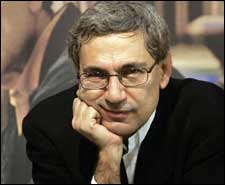Glittering Prizes, Sweden and Eternal Fame
What do they have in common, you may ask yourself. Orhan Pamuk is all. He won the Nobel Prize for Literature today, something I wait for like other people wait to see who won the Super Bowl or whether they'll ever catch that damn Lucky Charms leprechaun.
As is often the case, I was way ahead of the curve in buying his stuff, but I haven't read any of it. Yet. In fact I'm currently embroiled in two corkers, one of which -- From Here to Eternity -- they made a movie out of. The other is an incredible piece of historical research called The Breaking Point: Hemingway, Dos Passos, and the Murder of Jose Robles. Everyone who's ever gone through a Hemingway jag (I even read the letters, which are about as thick as a phone book) has got to read this book, and I don't italicize these things lightly. He was, in addition to being a complete ass, incredibly gullible and vain and stupid at times. Rather than telling you what the story involves, let me just say it's more compelling than To Have and Have Not. Which isn't saying much, but it does twist the knife in an interesting way.
And OP? He was charged by the Turkish government not too long ago for making unpatriotic statements but -- and what did they think would happen? -- everyone got on his side and they had to drop it. It was a black eye for Turkey, which it compounded when it tried to use the same charges recently against a second writer.

As is often the case, I was way ahead of the curve in buying his stuff, but I haven't read any of it. Yet. In fact I'm currently embroiled in two corkers, one of which -- From Here to Eternity -- they made a movie out of. The other is an incredible piece of historical research called The Breaking Point: Hemingway, Dos Passos, and the Murder of Jose Robles. Everyone who's ever gone through a Hemingway jag (I even read the letters, which are about as thick as a phone book) has got to read this book, and I don't italicize these things lightly. He was, in addition to being a complete ass, incredibly gullible and vain and stupid at times. Rather than telling you what the story involves, let me just say it's more compelling than To Have and Have Not. Which isn't saying much, but it does twist the knife in an interesting way.
And OP? He was charged by the Turkish government not too long ago for making unpatriotic statements but -- and what did they think would happen? -- everyone got on his side and they had to drop it. It was a black eye for Turkey, which it compounded when it tried to use the same charges recently against a second writer.
The Swedish Academy declared Pamuk the winner on a day when, to Turkey's fury, the French lower house of parliament approved a bill making it a crime to deny that the Armenian genocide had occurred.More from the London Times:
In a what was seen as a test case for freedom of speech in Turkey, Pamuk was tried for insulting "Turkishness" after telling a Swiss paper last year that 1 million Armenians had died in Turkey during World War One and 30,000 Kurds had perished in recent decades.
The court dismissed the charges on a technicality, but other writers and journalists still are being prosecuted under the article and can face a jail sentence of up to three years.
In a twist that considerably dampened celebrations in Turkey, the prize was announced on the day that the French Parliament approved a Bill to make it illegal to deny that the Armenian killings amounted to genocide. Abdullah Gul, Turkey’s Foreign Minister, said that his country would consider retaliatory measures against France. In Ankara, protesters pelted the French Embassy with eggs.I know frequent commenter mikeswanson has read My Name is Red, generally thought of as one of his better books -- I wonder aloud what he thinks of the choice. Political, aesthetic or both? Or neither? Did they just find him handsome?


1 Comments:
I don't remember too much about the style of the book other than there are several distinct voices throughout that introduce themselves in the chapter title, thus the title "My name is Red." The narration was hard for me to interpret, since the voice changes so often. It's definitely a mental exercise to determine what the narrator's point of view is. The mystery is set in Ottoman Turkey(16-1700s), I've heard that his characterization of the time and place is accurate, though despite reading this in the midst of an Ottoman History class, I can't confirm this hearsay. I remember he had a great passage about Venetian silver that allowed me to envision how inflation worked in the Ottoman empire. One of the overriding themes in the book is the role of art in the Islamic world as a modernizing influence. The Venetian silver in his book is an extended metaphor--its flooding into the Ottoman market and causing mayhem parallels the influx of western thought into the closed system of the Empire or the Islamic world maybe--a collision of worlds metaphor. This may be a obvious what with the European/Middle Eastern dual identity of Constantinople and the Empire itself, and I'm sure if I read this book again I would see more of a dialectical tension between Westernism and Islamicism throughout, not simply in one memorable theme. I hope I didn't ruin anything, maybe my studying the history at the time allowed me to see that this book has many levels. Or maybe I just read too much into it, but, dammit, that's the fun with crazy art novels like this one. Oops, I mean serious Nobel-laureate literature. Actually, nothing says it can't be both.
Post a Comment
<< Home